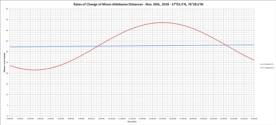
NavList:
A Community Devoted to the Preservation and Practice of Celestial Navigation and Other Methods of Traditional Wayfinding
From: Sean C
Date: 2018 Nov 8, 20:39 -0800
This discussion got me wondering about what the actual difference is between the rate of change of geocentric and topocentric lunar distances. So, I decided to pick a random date and graph the two to get in the ballpark of what that difference could be. [Note: the data I used (from MICA) does not include the effects of refraction.] I expected there to be two similar lines, separated by a small difference. When I finished the graph, I was surprised. Although, in retrospect, I shouldn't have been. Instead of two similar lines, there was a line and a sine wave. Of course, this is what I suppose one should expect - given that parallax in altitude is a function of the sine of the altitude.
What did match my expectations was the difference between the rates of change. The maximum difference [note that the data was calculated for each whole minute of one day.] was about 10.9 arc seconds or about 0.2' at 0228 UT1. The other maximum was about 10.8 arc seconds at 1504 UT1. IMHO, this is hardly a reason for concern.
Now, I would like to pose two questions to the more knowledgeable members of NavList:
- One: Can you imagine a scenario in which the difference in rates of change would be significantly more, and...
- Two: Would this potentially greater difference have a meaningful effect on using the slope for the intended purpose (i.e. finding an "average" LD and/or discarding outliers?)
...please discuss.
-Sean C.







